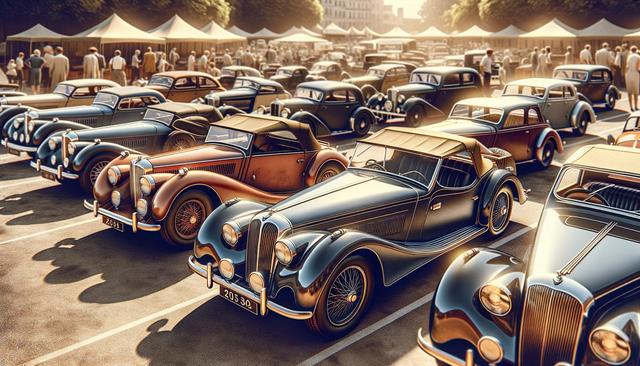Why Classic Cars Continue to Attract Enthusiasts
Classic cars remain a beloved segment of the automotive world, admired for their unique designs, mechanical simplicity, and nostalgic allure. Unlike modern vehicles that often prioritize efficiency and technology, vintage cars are celebrated for their character and historical significance. Whether it’s the sweeping lines of a 1950s coupe or the raw power of a 1970s muscle car, classic automobiles tell stories of a bygone era. Enthusiasts are drawn to these vehicles not only for their aesthetics but also for the experience they offer—driving a classic car is often more about enjoyment than practicality.
One of the key reasons people seek out classic cars for sale is the deep emotional connection they foster. For some, it’s about reliving cherished memories, while for others, it’s a new adventure into automotive restoration or collection. Collectors often focus on iconic models, rare editions, or vehicles with historical relevance. The appeal extends beyond nostalgia—owning a classic car is also about preserving a piece of history and craftsmanship that modern manufacturing seldom replicates.
What to Consider Before Buying a Classic Car
Purchasing a classic car involves more than just a love for vintage design. Potential buyers should carefully evaluate several factors before committing to a purchase. These considerations help ensure that the investment is worthwhile and that the car aligns with the buyer’s expectations and capabilities.
- Condition: Is the car in original, restored, or restomod condition? Each has different implications for value and maintenance.
- Availability of Parts: Are replacement parts accessible and affordable?
- Cost of Ownership: This includes insurance, storage, and long-term maintenance.
- Purpose: Will the car be driven regularly, used for shows, or kept as a long-term investment?
Additionally, it’s wise to have a trusted mechanic inspect the vehicle thoroughly. Classic cars can come with hidden issues—rust, engine wear, or electrical faults—that may not be immediately visible. Understanding the car’s history, including previous ownership and maintenance records, is also important. A well-documented vehicle not only adds value but also gives insight into how the car has been treated over the years.
Where to Find Classic Cars for Sale
Locating classic cars for sale has become easier thanks to a combination of traditional and digital platforms. Depending on the type of car and your budget, there are several avenues worth exploring.
- Classic Car Dealerships: These specialize in vintage and collectible vehicles, often offering warranties or restoration services.
- Online Marketplaces: Websites dedicated to car sales often have sections for classic models, complete with filters for make, model, year, and condition.
- Auctions: Both in-person and online auctions can be great places to find rare or one-of-a-kind classics, though they may require quick decisions and strong bidding strategies.
- Car Shows and Clubs: Networking within classic car communities can reveal private sales or upcoming listings not widely advertised.
Each option has its pros and cons. Dealerships may offer more security, but private sellers can sometimes provide better deals. Auctions can be exciting but risky if you’re not well-prepared. Regardless of the source, always verify authenticity and ensure that necessary documents, such as the title and VIN, are in order.
Investment Potential of Classic Cars
While many people buy classic cars for the joy of ownership, there’s also a growing interest in their investment potential. Over the past few decades, certain models have seen significant appreciation in value. However, not all classic cars are guaranteed to increase in worth, making careful research essential for those considering them as financial assets.
Factors influencing a classic car’s value include:
- Rarity: Limited production runs or discontinued models often fetch higher prices.
- Provenance: A car with a notable history or famous previous owner can command a premium.
- Condition and Originality: Cars with original parts and minimal modifications tend to retain or grow in value more reliably than heavily modified versions.
- Market Trends: Popularity can fluctuate depending on cultural influences, anniversaries, or media appearances.
It’s also important to remember that the classic car market, like any collectible industry, can be unpredictable. For those new to investing in vintage vehicles, it might be wise to consult automotive appraisers or financial advisors with experience in this area. Long-term maintenance and secure storage are also vital aspects of protecting your investment.
Maintaining and Enjoying a Classic Car
Owning a classic car is both a hobby and a responsibility. Regular maintenance is key to preserving the vehicle’s functionality and appearance. Routine tasks might include oil changes, tire care, brake inspections, and battery upkeep. Unlike modern vehicles, classic cars often require more hands-on attention and may benefit from specialist mechanics familiar with older systems.
To fully enjoy your classic car, consider joining local car clubs or participating in vintage car rallies and exhibitions. These events offer a platform to meet like-minded enthusiasts, exchange tips, and showcase your vehicle. Some owners also enjoy restoring cars themselves, turning the process into a rewarding personal project.
Proper storage is another crucial aspect of classic car ownership. Cars should be kept in a dry, climate-controlled environment to prevent rust and deterioration. Using car covers, fuel stabilizers, and battery maintainers can extend the life of your vehicle during periods of non-use.
Ultimately, maintaining a classic car is about more than preservation—it’s about honoring the craftsmanship and stories embedded in every detail. With care and passion, classic cars can remain roadworthy and remarkable for generations to come.






